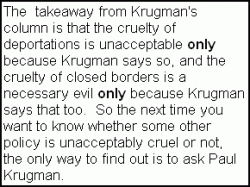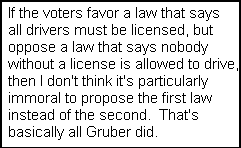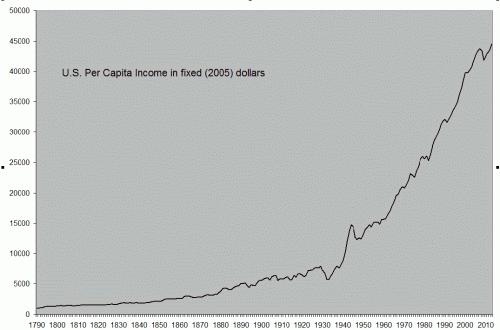Here’s one difference between me and Paul Krugman: He enthusiastically supports President Obama’s new immigration policy, which he calls a matter of human decency. I grudgingly support President Obama’s new immigration policy, which I call a bit less indecent than the policy it replaces.
 Here’s another difference between me and Paul Krugman: I believe it’s the job of an economics journalist to call attention to unpleasant tradeoffs and offer frameworks for resolving those tradeoffs. Krugman apparently believes it’s the job of an economics journalist to sweep all tradeoffs under the rug in the name of advancing your policy agenda — appealing, if you will, to the stupidity of the American op-ed reader.
Here’s another difference between me and Paul Krugman: I believe it’s the job of an economics journalist to call attention to unpleasant tradeoffs and offer frameworks for resolving those tradeoffs. Krugman apparently believes it’s the job of an economics journalist to sweep all tradeoffs under the rug in the name of advancing your policy agenda — appealing, if you will, to the stupidity of the American op-ed reader.
Krugman, for example, tells us that he opposes deportations because they’re cruel, but also opposes open borders because they’d make it both economically and politically impossible to maintain the modern American welfare state.
In furtherance of which, he offers this kind of claptrap:
Second, there are large numbers of children who were born here … but whose parents came illegally, and are legally subject to being deported.
What should we do about these people and their families? There are some forces in our political life who want us to … deport the undocumented parents of American children and force those children either to go into exile or to fend for themselves.
But that isn’t going to happen, partly because, as a nation, we aren’t really that cruel
Dammit, I hate this stuff. Krugman says (and I agree with him) that it’s cruel to deport people. He ignores the fact that it’s also cruel to keep other people out. Krugman says (and I agree with him) that letting more people in would put pressure on the welfare system. He ignores the fact that allowing people to stay also puts pressure on the welfare system. Why should we prioritize kindness to those who are already here over kindness to those who are clamoring to get here?
There might be a really good answer to that question, but you’d never know it from reading Krugman. In fact, the takeaway from Krugman’s column is that the cruelty of deportations is unacceptable only because Krugman says so, and the cruelty of closed borders is a necessary evil only because Krugman says that too. So the next time you want to know whether some other policy is unacceptably cruel or not, the only way to find out is to ask Paul Krugman.
And then there’s more:











